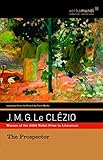After all the talk that America is a literary backwater, it’s not terribly surprising that the Nobel Prize went to an international writer. Jean-Marie Gustave Le Clezio is not a very well known name. In fact, he only has a few of books translated into English that are in print.
Wandering Star “tells two discrete stories of two young girls, one Jewish and one Palestinian, who meet once briefly by chance. Their stories are connected by substance, rather than plot. Each is a wandering star in search of a homeland-Esther escaping the Nazi holocaust, and Nejma, who experiences the horrors of life in the camps.” The Round and Other Cold Hard Facts is a collection of stories. “Set largely in locations near the French Riviera, these eleven short stories depict the harsh realities of life for the less-privileged inhabitants of this very privileged region.” The Prospector (link to more info on the publisher’s site): “Haunting and lyrical, this Bildungsroman of the narrator’s search for the lost treasure of the Corsair is near-mythic but has realistic details that bolster its plausibility. Set in early 20th-century Mauritius, the story follows the life of a young man who, after the death of his father, tries to restore his family’s fortunes by tracking down some buried gold.” And The Mexican Dream: Or, The Interrupted Thought of Amerindian Civilizations, which Booklist described as a “brilliantly conceived analysis of Mexican civilization as a series of ‘dreams’ that come into conflict is breathtakingly well written, sweeping us away with the intensity and lapidary shimmer of its prose.”




Judging by the very low (as of this writing) Amazon rankings, Le Clezio hasn’t had much of a readership in the US, but this will likely change as publishers rush to get more of his books into print. Books and writers and Wikipedia offer up longer bios of Le Clezio.
Update: Another that’s been translated and is in print is Onitsha: “Onitsha tells the story of Fintan, a youth who travels to Africa in 1948 with his Italian mother to join the English father he has never met. Fintan is initially enchanted by the exotic world he discovers in Onitsha, a bustling city prominently situated on the eastern bank of the Niger River. But gradually he comes to recognize the intolerance and brutality of the colonial system. His youthful point of view provides the novel with a notably direct, horrified perspective on racism and colonialism.”
Update 2: The Lit Saloon rounds up excerpts from decades of reviews of Le Clezio’s work. Decidedly mixed.









